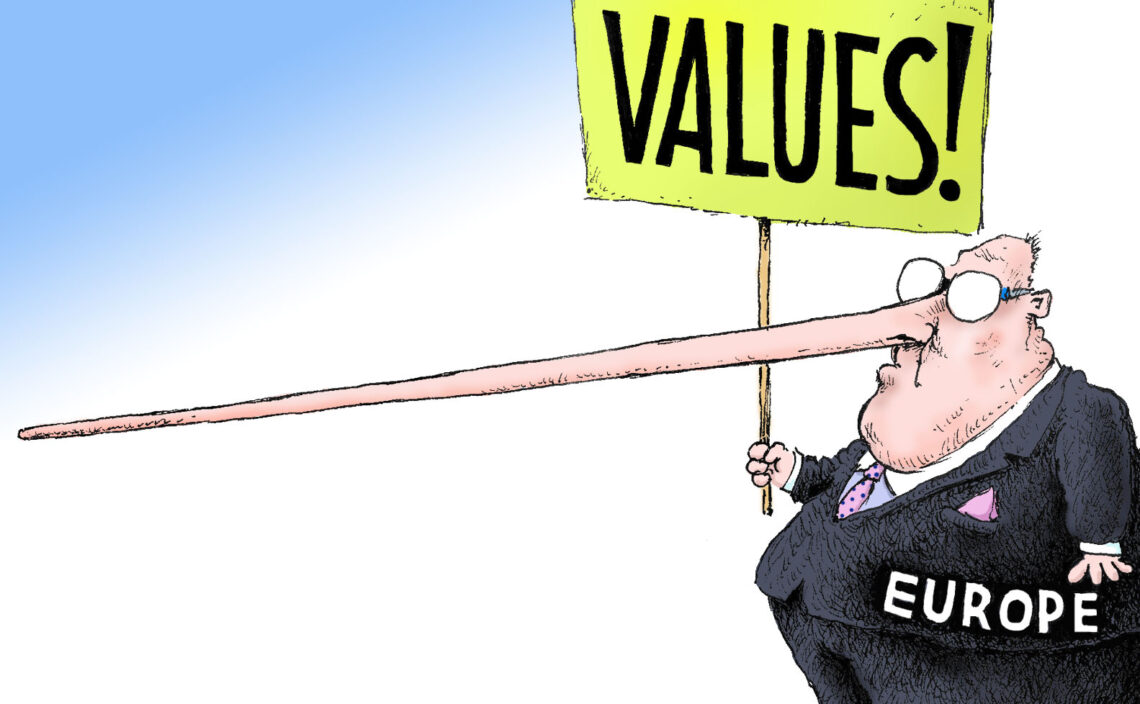Europe’s heedless foreign and security policies
European countries say they base their foreign policies on values – but doing so has led to inconsistency in how they treat international partners. Consequently, Europe has taken the wrong stance on military exports, the Iran nuclear deal and the U.S.-China trade dispute. Recent events, however, may have provided a wake-up call.

Sustainable foreign and security policies are driven mainly by interests. Certainly, states may consider value issues, but meddling in the internal governance of other countries should be avoided. An exception to this rule of thumb can be made when genocide or severe oppression of religious or ethnic minorities takes place.
Interests do not contradict values. Countries should retaliate against instances of state-sponsored aggression and terrorism, as well as unfair trade practices.
European countries’ foreign policies, however, have been made erratic by their so-called values. They hold these values up as paragons of virtue but apply them inconsistently. Approaches vary between the three largest European countries – the United Kingdom, Germany and France – and the European Commission, which plays a more virtual than real role. Foreign partners find their stances unreliable.
One consequence of such value-driven policies is Europe’s web of restrictions on military equipment exports. These constraints render the development of an efficient European defense industry impossible, thereby hindering Europe’s ability to defend itself. As a result, the continent lacks international credibility.
Iran: A wake-up call
Ignoring both their values and their long-term interests, most European countries oppose the policies of United States President Donald Trump toward Iran and want to keep the 2015 nuclear agreement with Tehran in place.
Washington’s criticism of the deal is twofold. First, the White House believed the treaty did not go far enough to prevent Iran from becoming a nuclear power. Second, and most importantly, the deal did not address Iran’s policies of sowing conflict throughout the region. Tehran maintains that Israel must be destroyed and supports terrorist activities abroad through Hezbollah and other organizations. It instigated the catastrophic civil war in Yemen and continues to support the Houthi rebels there, who also have attacked Saudi Arabia with Iranian support.
Perhaps now Europe will realize that U.S. policies may not have been so wrong.
European foreign policy has focused on salvaging the agreement, ignoring the above-mentioned concerns, even though Iranian-sponsored terrorists have planned several attacks in European countries, like Denmark and the Netherlands. Instead, governments have preferred to criticize Saudi Arabia. The terrible human rights situation in Iran garners little attention from European media and political leaders. On the other hand, Saudi Arabia’s human rights abuses are frequently condemned.
As opposed to Tehran, Riyadh did not start the war in Yemen. Saudi Arabia has become embroiled in the conflict for defensive reasons, yet it is continuously criticized for its role. While there is room for criticism of Saudi Arabia’s actions in Yemen, the fundamentalist regime in Tehran deserves at least as much condemnation.
The recent attack on a Saudi Aramco refinery was a wake-up call. It was almost certainly sponsored by Iran. Perhaps now it will dawn on European foreign policy strategists that the Trump administration’s stance was not as misplaced as some had suggested.
China: Values put aside
The trade dispute between the U.S. and China is another such case. Politicians and media on the eastern side of the Atlantic (and some in the U.S.) talked as if the conflict was more of a hobby for President Trump than a valid response to China’s price dumping, economic espionage, market-access discrimination and failure to respect intellectual property rights.
Some had the narrow-minded hope that Europe could profit from this conflict of giants and increase its trade with China. Values were put aside. There was little talk about the situation of the Uighurs and the prosecution of Christians in the People’s Republic.
The recent events in Hong Kong, although they were minor compared to the above-mentioned human rights violations, finally brought the European public to its senses. Perhaps now Europe will realize that on China, too, the U.S. position may not have been so wrong and acknowledge the U.S. policy.
Europe should not follow U.S. policies in all aspects. The administration’s directness in its communication style shocks established diplomats, but this is not the crux of the issue. Still, European and U.S. interests are not always the same.
A truly negative aspect of this situation, however, is that some European governments – with strong support from American opposition in both parties – seem to believe it is more important to antagonize the Trump administration than to lead a realistic foreign policy that balances interests and values.
